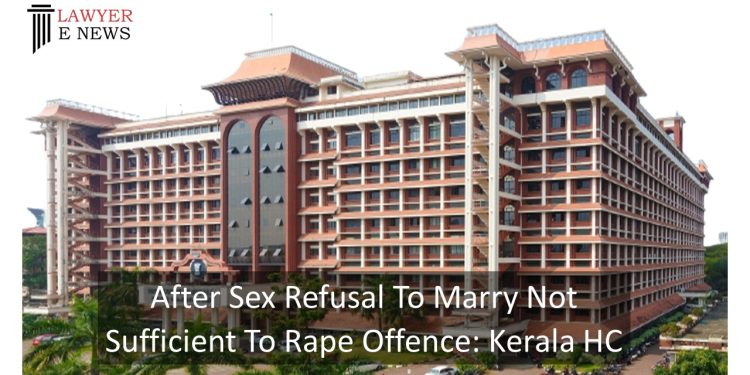After Sex Refusal To Marry Not Sufficient To Rape Offence: Kerala HC

D.D:08-07-2022
The Kerala High Court held, in granting bail to a Central Government Counsel in a sexual assault case, that a subsequent refusal to marry or failure to lead the relationship into marriage is insufficient to constitute the crime of rape, even if the partners had engaged in a physical relationship.
Justice Bechu Kurian Thomas stated that a sexual relationship between two consenting adults does not constitute rape under section 376 of the Indian Penal Code unless the consent for sex was obtained through fraud or misrepresentation.
“Even if a sexual relationship between two consenting partners does not result in marriage, it does not constitute rape if there is no factor that vitiates the consent for sex. Even if the partners had engaged in a physical relationship, a subsequent refusal to marry or failure to lead the relationship to marriage are not sufficient to constitute rape. The sexual relationship between a man and a woman only constitutes rape if it was against her will or without her consent, or if consent was obtained through force or deception.”
The Court added that consent for sex obtained through a promise to marry constitutes rape only if the promise was made in bad faith, is tainted by fraud, or was not intended to be honoured at the time it was made.
“In order to convert a physical relationship between a man and a woman into rape due to a breach of the promise of marriage, the woman’s decision to engage in the sexual act must be based on the promise of marriage,”
The judge ruled that in order to establish a false promise, the promisor must have had no intention of keeping his word at the time he made it, and the promise must have induced the woman to consent to the physical relationship. This implies that there must be a direct connection between the physical union and the marriage vow.
The petitioner was arrested under Sections 376(2)(n) and 313 of the Indian Penal Code after a colleague filed a sexual abuse complaint against him, alleging that he sexually abused her by luring her with a false promise of marriage.
The complainant claimed they had been in a relationship for the past four years. However, she discovered that he was marrying another woman when she ran into him and his fiancee at a hotel. Soon after, the complainant allegedly attempted suicide by slitting her wrist and was immediately hospitalised.
The prosecution also alleged that during the course of the investigation, it was discovered that the victim was forced to undergo two miscarriages at the instigation of the petitioner; therefore, section 313 of the Indian Penal Code was also included. She explained the reason for her suicide attempt in a statement to the police, which revealed the incident. The petitioner was therefore arrested. The petitioner had approached the High Court seeking regular bail in this case.
Yesterday, when the case was heard, the Court made similar observations about the changing nature of relationships between young adults. The judge added that this shift in relationships has resulted in an increase in alleged rapes after these couples divorce and marry new partners. However, this does not always indicate that one of the partners was coerced into a sexual relationship in exchange for a false promise of marriage.
Today, the Court granted bail to the petitioner subject to certain conditions, noting that despite the petitioner’s alleged involvement in serious crimes, it was unlikely that he would evade justice given that he is a central government attorney.
Advocate C.P. Udayabhanu instructed Senior Advocate Ramesh Chander to represent the petitioner, while Advocate John S. Ralph represented the de-facto complainant.
Navaneeth N Nath
versus
State of Kerala






